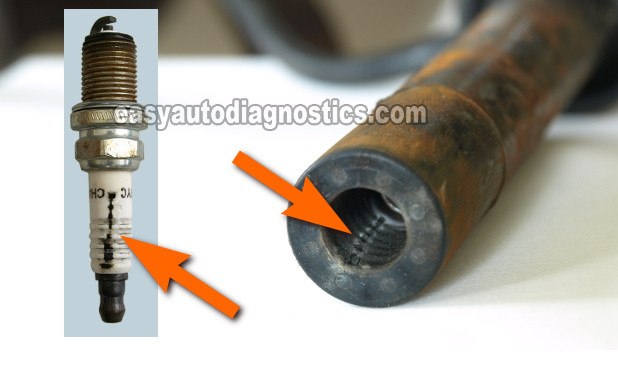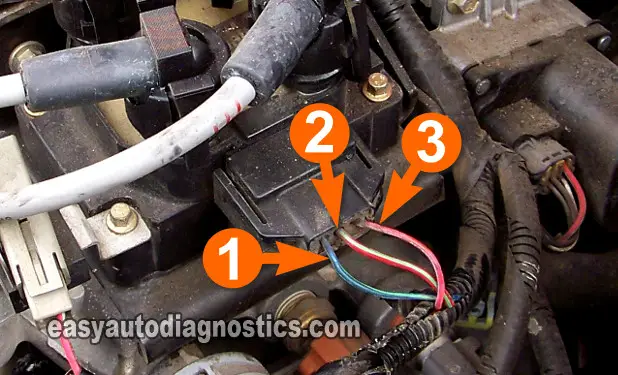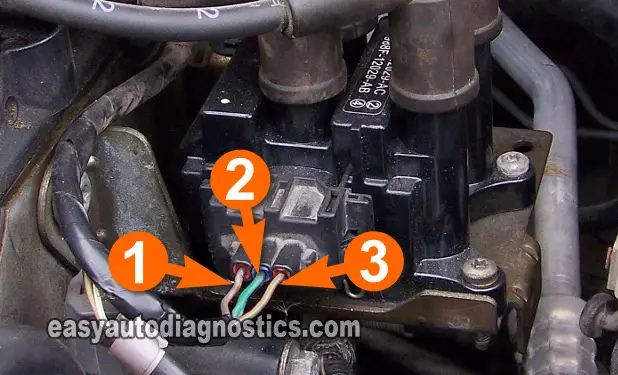TEST 6: Switching Signal For Cylinders 2 And 3
Here you're going to verify that the ignition coil (within the coil pack) that fires spark to cylinders 2 and 3 is receiving its switching signal from the PCM. This signal test is done with the coil pack's connector connected to it.
These are the test steps:
- 1
Connect the black lead of the LED light to the wire identified with the number 3 in the image viewer.
This is the wire that feeds the Switching signal to the ignition coil (within the coil pack) that feeds spark to cylinders 2 and 3 simultaneously. - 2
Connect the red lead of the LED light to the battery positive (+) terminal.
- 3
Have your helper crank the car (the engine may start so be careful).
- 4
If the engine starts, have your helper turn it OFF.
- 5
If the Switching signal is present, the LED light will flash ON and OFF the whole time the engine was cranking and during the time it was running.
Let's find out what your test result means:
CASE 1: The LED light flashed ON and OFF the whole time the engine was cranking or running. This is the correct test result and it means that the PCM is providing the Switching signal and the circuit is OK.
You can conclude that the ignition coil pack is bad if you have:
- Confirmed that the spark plug wires for cylinders 2 and 3 are not sparking (TEST 1).
- Confirmed that the ignition coil towers for cylinders 2 and 3 are not sparking (TEST 3).
- Confirmed that the ignition coil pack is receiving the 2/3 activation signal from the fuel injection computer in this test section.
CASE 2: The LED light DID NOT flash ON and OFF the whole time the engine was cranking or running. This usually means that there's either an open-circuit problem in the wire between the connector and the PCM or the PCM is fried (altho' a fried PCM is rare).
With this result you have eliminated the coil pack as the source of the misfire condition or no-spark condition.
TEST 7: Other Things That Can Cause A Misfire

So you've done all of the spark tests, and still your Ford (or Mercury or Mazda) four banger is still running rough (rough idle) and/or the misfire is still present. Well, here are a couple of suggestions that might help:
- Inspect the inside of the spark plug wire boots and the ceramic insulator of the spark plug for carbon tracks
- The the orange arrows in the photo above point to what carbon tracks look like.
- Replace the components as affected with carbon tracks.
- Engine compression test.
- One of the most overlooked diagnostic tests to find the root cause of misfire is the compression test.
- You'll need an engine compression tester of course.
- The engine between cylinders should not vary more 15%.
- Fuel injector test.
- There are several methods to test them which are beyond the scope of this article, but the fastest way to test them is by checking the resistance (Ohms) value of each one and comparing them to each other.
- Any resistance that's not within the average of the others indicates the fuel injector is fried.
- You can buy a specific fuel injector tester on line that activates by a predetermined pulse width and measuring the fuel pressure drop on a fuel pressure gauge.
Real Life Case Studies From easyautodiagnostics.com Readers
In this section, is input and feedback from all of the folks who have had a coil pack issue with their vehicle and found a solution. If you're one of them, thank you for sharing your experience with all of us! If you want to share your repair and/or diagnostic experience, you can use the contact form below.
Real Life Case Study 1
Vehicle: Ford 4 cyl ignition coils
Trouble Codes: None
Complaint: No Start, coil pack burning out
Test Notes: “Hello, I have been reading through your guide to testing ignition coils and thought id let you know of an issue we have found here in the UK with some Fords in particular the Focus. I am a trained Ford tech, and now i am a roadside patrol.”
“The issue we found was that after all relevant checks were carried out and the coil replaced the vehicle would, after some time, have a reoccurring fault on the new coil. Basically when checking for the centre pin 12v feed we noticed on one particular vehicle the voltage was still present when the ignition was switched off, (easy to miss when checking as most assume all is OK when 12v is present). Basically after investigation we found that the vehicles had a PCM (ECU) fault that was keeping the coil center pin live, this in turn was burning out the primary windings.”
“Obviously replacing the coil is only treating the symptom not the cause and any new coil will eventually burn out. Also on the same type of coils high resistance in the HT leads (high tension cables = spark plug wires) and worn spark plugs will cause a new coil to prematurely fail. Thanks for your time and keep up the great work.”
Repair: Check for continuous voltage on power circuit and if so, check PCM and if defective replace.
Replace high tension cables (spark plug wires) if found with high internal resistance.
Replace worn spark plugs.
Info Provided Courtesy of: Scott Barker
Notes: Thank you Scott for the feedback. Here in the States, one of the things that I have run across a lot (since I work full-time as an auto tech in a repair shop) with all of the 4 cylinder coil pack equipped Ford cars (Escort, Focus, etc.) is bad spark plug wires (high tension cables) not transmitting the spark from the coil tower to the spark plug.
The usual symptom is a tremendous lack of power when accelerating (since it'll idle just fine -no misfire). This is caused by the spark plug wire having too much resistance,. which like you mentioned, will eventually cause the coil pack to fail.

If this info saved the day, buy me a beer!



